- Home
- Michelle Richmond
Golden State Page 16
Golden State Read online
Page 16
“Tom plays the organ?”
“He plays everything. Anyway, the dead guy’s sister recruited Lily to sing. They got together the day before the funeral to practice, and when I asked what she was like, he shrugged and said, ‘Just regular.’ ”
“Red alert,” Kim says.
“Precisely. When we got to the funeral, I spotted her before he even introduced us. She’s totally Tom’s type: red hair, bangs, very petite. Wearing this wacky black dress with fur around the collar, like she just stepped out of Betsey Johnson. The pastor does his thing, and then Tom and Lily get onstage. He’s on the organ, and she’s standing beside him, holding the mike like she’s auditioning for American Idol. She exudes this self-congratulatory aura, like she’s got Jesus on speed dial. You should have seen the look on her face after she sang the ‘Hallelujah’ hymn.”
“Can she sing?”
“Unfortunately, yes. So the next song they do is ‘Open,’ by Mike Scott. Do you know it?”
Kim shakes her head. “Never heard of it.”
“It’s supposedly a religious song, but it has this sexual subtext. So Tom’s up there onstage, rocking out on the organ, very intent on the music. She’s standing beside him, and she can’t take her eyes off him. Even though it’s an incredibly sad occasion, she looks like she’s thinking about something else.”
“Did you talk to her?”
“Yes. At the reception. She goes on about how lucky I am to have landed such a good one, how Tom hasn’t changed in twenty years. Apparently, she just moved back to the Bay Area, she’s a fan of Anything Is Possible, she’d been meaning to call him and catch up, et cetera, and then, voilà, she gets the call from the sister. Tom seems kind of unaware the whole time, like he doesn’t even realize she’s into him. But as we were standing there in this dreary room of the church after the funeral, next to a table decked out with those sad little round Costco brownies and sweaty rectangles of cheese, I was thinking, This can’t end well. He swears nothing happened until after we were separated, but a couple of weeks after he moved out, I saw them together.”
“No. Where?”
“I was running errands on Cole Street after work. As I was walking by Zazie, I just happened to glance in the window and see him. He wasn’t alone. At first I couldn’t tell who he was with. I figured it was some sort of work thing. There were plates on the table, glasses. I started to go inside, but as I got closer, I realized that it was Lily.
“It felt as though I was witnessing some private moment. The way he was sitting, with his arm draped over the back of his chair, the way he fiddled with the salt shaker, even the way he’d snagged the coveted window seat at prime dinner hour—it was all so familiar. It was the same way he acted with me, that same casual intimacy. I tried to tell myself it was nothing, but it didn’t look like nothing. Then she reached over and picked up his glass and took a sip from it, and he didn’t react. That’s when I knew something was off.”
“I probably shouldn’t tell you this …” Kim says.
“What?”
“I always thought it was a little odd—the two of you. I mean, he’s very charismatic, and he’s great at what he does. I get that. It’s just, you’re so different. Did you know that in medical school, a bunch of us took bets on how long your relationship would last?”
I raise an eyebrow. “How long did you give me?”
“Two years,” she says, shrugging. “Sorry—though I was at the high end.”
“Well, I proved you wrong,” I say. “You totally owe me a martini.”
“Let’s set a date.”
A familiar announcement comes over the intercom, and I instinctively snap to attention. So does Kim.
“Shit, I’ve got a code.” She thrusts the end of the bandage into my hand.
Code. Though I’ve heard the word a thousand times, it never fails to startle me. It’s a strange word for cardiopulmonary arrest, someone at death’s door, requiring the instant summoning of a whole team of doctors and nurses. After a while you get used to the codes, but for me, there’s always that first second when the beeper goes off or the announcement comes over the loudspeakers, a switch flipping in my chest, sending my own heart rate through the roof. It’s the immediacy that gets to me, I guess—the fact that, minutes later, a person’s fate will have been decided, and their life will have either resumed or ended. Precious, excruciating minutes during which everything you do counts exponentially. If everything goes just right, you save a life. Screw up, and you’ve lost one.
“Dmitri will bring you some crutches,” Kim says, disappearing out the door.
“I owe you,” I say to her back. Strange how a code can put everything, instantly, in perspective.
I finish wrapping the bandage from toes to ankle, up to my calf, tight but not too tight. I’m taping it in place when a stocky young man with a ponytail taps on the open door. “Dr. Walker?”
“Yes?”
“These are for you.” He leans a pair of crutches against the bed and hands me a cup of water, some small white pills, and a stretchy sock to cover the bandage.
“Thanks.” I pull on the sock, tuck my useless shoe into my bag, and swallow the Tylenol.
Passing the nurses’ station, I hear a snippet of sound from a radio, turned down low. “The exit poll numbers are starting to roll in,” Tom says, “and it could go either way.”
A young woman in pink scrubs stands by the radio, shaking her head. “I don’t believe this,” she says. “Do you believe this?”
My ears are alert, waiting to hear what song Tom will choose next. Last night, he was still trying to figure out the right songs to play in case he was on air when the results of the vote were announced. Ultimately, he decided on Al Green’s “Let’s Stay Together” if the voters rejected secession, Tom Petty’s “California” if the vote was yes. “Petty grew up in Florida,” he explained. “He’s this southern guy who moved to L.A. and made it big. That’s what California’s about, really. You’ve got people like me, who are so proud of being born and raised here, but the essential character of California is that it’s a destination, a golden ideal. People come here from somewhere else, with their big dreams. Maybe the dreams work out, maybe they don’t; either way, people stay and make their lives here. Like Tom Petty did. Like you did.”
Secretly, I’m hoping to hear Al Green.
32
“Tell me something,” Dennis says, almost playfully.
“What?”
I picture the gun in his hand. I picture Rajiv and Betty. I try not to think about Eleanor. Last year, when all those people died at the mall shooting in Missoula, CNN interviewed several survivors who said the same thing: as it was happening, it felt more like a movie than real life.
This, on the other hand, feels startlingly real. Fifty-one minutes have passed since I knocked on Heather’s door, and still we’ve got no crisis response, no hostage negotiator. No nurse. Heather is pacing the small room, moaning quietly. I struggle to quell a rising sense of hopelessness.
“That time I came in the VA with the stomach pains,” Dennis says. “You remember how I asked you out, right?”
“Yes.”
“I’m just wondering, if you weren’t with Tom, would you have said yes?”
I’d like to believe the answer is no. I’d like to believe that if I hadn’t met Tom, I would have met and fallen in love with someone else who was responsible and kind. I’d like to believe that I would have established some equally meaningful life. But the answer isn’t so clear. It was luck that brought me face-to-face with Tom that night at the Fillmore—one of those chance meetings that might just as easily not have happened. But what if I’d never gone to that particular concert, smoked a joint, and felt myself floating through the air? What if I’d never been lifted out of the crowd by a stranger?
What if, on the day Dennis came into the VA, I’d been single? I remember how it felt, moving the paper gown aside and touching his skin. I remember the electricity in that touch, the sw
ift and inappropriate pulse of lust. And now, all these years later, I remember the decision I made, without looking back, to walk away from anything beyond a platonic friendship with him. I had already chosen Tom.
There are so many paths a life can take. So many ways it can go right, and infinitely more ways it can go wrong. Sometimes the only thing standing between us and disaster is a fortunate accident.
“Well?” Dennis persists. “Would you have gone out with me?”
“Probably.”
“I would have treated you really well, you know.”
“Yes, Dennis, I know.”
33
9:51 a.m.
Outside the hospital, I pull the red Bakelite out of my bag and adjust the dial. After a few seconds of static, Tom’s voice comes through loud and clear. “I’m getting reports that there’s a tent city growing in Golden Gate Park near the Conservatory of Flowers,” Tom says. “The group is organized by Geeks for a Free California. Rumor has it some of the biggest names in Silicon Valley are there. Of course, this isn’t the first time Golden Gate Park has been home to a tent city.”
He’s talking about 1906, when the park became a massive refugee camp for victims of the earthquake. I turn the volume up just a bit to hear the beginning to Gil Scott-Heron’s “The Revolution Will Not Be Televised.” I drop the radio into my bag, grab the crutch handles, and start moving, the rhythm of the song propelling me forward. The crutches dig at my underarms, but I like the feeling of lifting and falling, lifting and falling, the unnaturally long strides.
I’m matching Gil Scott-Heron word for word, moving along with the beat. And even though Tom didn’t say it, I know this song is for me, too. This is the man who made an art out of creating music mixes for me to run by. He knows that when I hear this song, I always move a little bit faster. The song comes to an end, and my husband’s voice cuts in: “No disrespect intended, Mr. Scott-Heron, but I’m watching CNN as we speak, and the revolution is definitely being televised.”
My ankle is swelling against the bandage, the pressure adding a peculiar new twinge to the pain. From here I can see the crowd still gathered in the middle of the road, growing bigger. I turn up the volume on the radio, hoping for more music, anything to keep me going, anything to keep my mind off the pain.
“Here’s to the one who knows me best,” Tom says. “And, as always, here’s to Joe. It’s Little Steven, singing ‘Inside of Me.’ ”
A long time ago, Tom told me that the secret to being a good radio host is that you never speak to the audience at large. “When you lean in to the microphone, you have to imagine that you’re speaking to just one person,” he said. “For years, I’ve had this picture in my mind of some lonely guy named Joe sitting in his flat on Potrero Hill, lights off, kicking back with a beer. It’s weird, but I can sort of see the guy, jeans and a wrinkled T-shirt. He needs a haircut, he needs a whole new outlook on life.”
Sometimes Joe would randomly make his way into our conversations. “I wonder where Joe is tonight,” I might say over dinner.
“He has a date,” Tom would say, “with this girl he just met at the gym.”
“He’s going to the gym now, is he?”
“Yes, he got a membership. He’s getting in shape, getting his life together. He’s even looking into investing in an IRA.”
“But first he’ll need a better job.”
“Didn’t I tell you? He just got a promotion.”
“Good for him,” I’d say. “Here’s to Joe, and to new beginnings.” And we would raise our glasses in a toast to Joe, the ideal listener.
Joe had become such an oft-mentioned topic between us that he almost felt like a real person, like some friend you haven’t seen in years, the one who’s always planning to visit next summer, who lurks on the fringes of your life. And in his mind, when he was on the air, Tom really was talking to Joe. The trick must have worked, because when I listened to my husband on the radio, it felt as though I were eavesdropping on a conversation he was having with someone else, a conversation in which, at any moment, some intimate secret might be revealed.
I’ll never forget the morning, about a year and a half into our marriage, when I was driving to work, my car radio tuned to KMOO. Lloyd Cole was in the studio, doing a promo for a show he was playing with Jill Sobule that night at the Great American Music Hall. When Tom asked him about one of his songs, Lloyd Cole said the lyrics had been inspired by the work and life of Václav Havel, the great Czech playwright, revolutionary, and, at that time, president of the Czech Republic.
“I met him once,” Tom said.
“Oh, yeah?”
I waited for Tom to clarify, but he didn’t. Instead, he asked Lloyd Cole to sing “Music in a Foreign Language,” and then the station went to a commercial break. When Tom came back on the air, Lloyd Cole was gone, and the subject of Havel with him.
When I got home from work that night, Tom had dinner on the table. “What’s the story with Václav Havel?” I asked. “You didn’t actually meet him.”
“I did,” he said.
“How? Where? When? Why didn’t you tell me?”
“Prague, a couple of years before I met you,” he said, heaping green salad onto my plate. “I was there for a writing workshop.”
“You attended a writing workshop in Prague?”
“Sure. I applied by sending in a manuscript, and someone had the poor judgment to let me in. You go and spend two weeks drinking Czech beer and sitting around a table tearing people’s stories to pieces.”
“Since when do you write stories?”
“I don’t. I was just kicking the idea around back then, and I thought I might as well give it a go. Anyway, the guy who led our workshop had us read The Garden Party and Temptation. He claimed that Havel was a personal friend of his, but I didn’t believe him. Lo and behold, on the final day of our workshop, the president himself pays us a surprise visit.”
“Amazing,” I said.
“In hindsight, I guess it was. But when you’re young, you don’t realize you’ve had a once-in-a-lifetime experience until long after the fact. Anyway, after class, everyone else headed off to the bar for a drink, but I decided to wander around the building, because I’d heard there was a room somewhere on the fourth floor that housed the original manuscript of Milan Kundera’s The Book of Laughter and Forgetting.”
“Did you find it?”
“No, but I did find Mr. Havel.”
“What?”
“The building had these labyrinthine staircases,” Tom began, “and I got hopelessly lost. At one point, wandering through this weird, dark tunnel of a hallway, I came upon two large, well-dressed men, standing outside the men’s room. It was sort of creepy, but I really needed to relieve myself, so I put aside my reservations and went in. As soon as I stepped through the doorway, I realized one of the men had followed me inside. My heart stopped—I thought I’d walked into some strange trap—but then I saw the president standing there at the urinal, and I realized the men were his bodyguards.”
“What did you do?”
“Well, that’s the funny thing. The bathroom was tiny. It only had three urinals, and between each urinal, in some bizarre and pointless attempt at privacy, was a concrete wall that was only about three feet high—which seemed obscene, because instead of hiding anything it drew attention to things. Mr. Havel stood at the urinal to the far left, so naturally I stepped up to the one on the far right. ‘You won’t want to do that,’ Mr. Havel said pleasantly. I apologized, assuming he wanted his privacy. I turned toward the door to leave, but the bodyguard was right there, blocking my path. I was trying to figure out a graceful way to get past him when Mr. Havel said, ‘The pipe is disconnected.’
“I looked at the urinal where I’d been standing, and he was right. On the face of it, everything looked fine, but upon closer inspection I saw that the pipe that was supposed to connect the urinal to the wall was missing. So I stepped up to the middle urinal. There we stood, the president and I, peeing
side by side, separated only by this pointless concrete wall, while the bodyguard stood against the door, eyes fixed discreetly on a tiny window that looked out onto Prague Castle. And I remembered what my mother used to say when I was growing up, an awkward kid with all these grand visions in my head of meeting Keith Richards and Bruce Springsteen and Iggy Pop. I had posters of these guys all over my walls, I followed them in the magazines, I wrote fan letters that invariably went unanswered—except Bruce. Bruce actually answered one, but that’s another story. And my mother would often say, ‘They have to go to the bathroom just like the rest of us, you know.’ Standing there beside Mr. Havel, I realized she’d been right.
“A few years after that, I was working at KMOO, and these rock stars were coming in all the time. Whenever I got nervous about meeting or interviewing a musician I admired, I’d prepare myself by visualizing Václav Havel at the urinal, relieving himself.”
Tom was smiling mischievously.
“You’re pulling my leg,” I said.
The smile vanished, and he looked utterly earnest. “No, all true.”
“Why didn’t you ever tell me?”
“You never asked.”
It was one of the things about Tom that both mystified and disturbed me. Anytime something about his past came up, some surprising story that I thought I should have been privy to before, he would excuse his failure to tell me by saying, “But you never asked.” The problem with this logic was that the questions would have been impossible to formulate, because any question that would solicit one of his stories would have to be so specific that the only way to ask it would have been to know the story in the first place. This strange, disconcerting catch-22 was built into my life with Tom. I never knew the right question, so I had to wait for the stories to come to me, unbidden, in bits and pieces, often over the public airwaves.

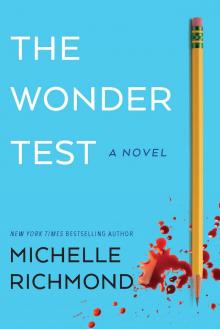 The Wonder Test
The Wonder Test The Year of Fog
The Year of Fog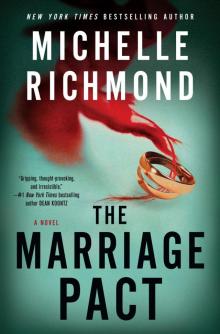 The Marriage Pact
The Marriage Pact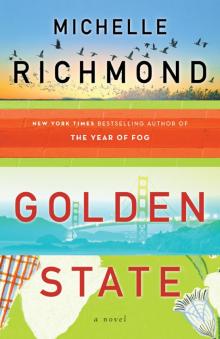 Golden State
Golden State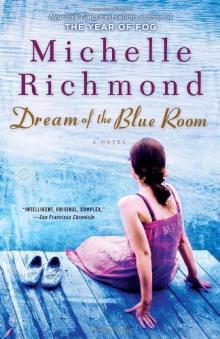 Dream of the Blue Room
Dream of the Blue Room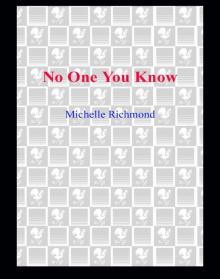 No One You Know
No One You Know